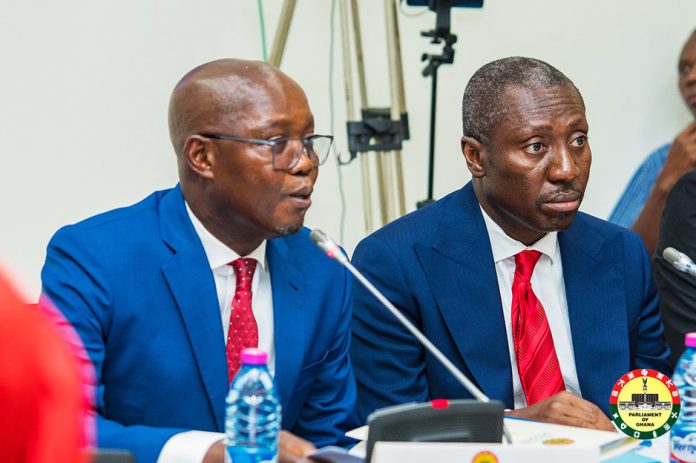Drama unfolded yesterday in Parliament when members of the Appointments Committee began vetting Justice Baffoe-Bonnie, President Mahama’s nominee for the position of Chief Justice.

What was expected to be a solemn and dignified constitutional exercise soon degenerated into heated exchanges between the Majority and Minority sides, testing the very decorum of Parliament.
The sitting began in relative calm until Minority Leader and Member for Effutu, Alexander Afenyo-Markin, took the floor.

He began his opening statement with a flourish quoting Shakespeare’s Macbeth to describe the solemnity and gravity of the day’s proceedings.
“Gentlemen, this morning, on behalf of the caucus, we are here with a heavy heart but an unshakable resolve to defend the Constitution of Ghana, protect judicial independence and uphold the rule of law,” he declared.
He described the nominee as a “disputed nominee” and said the process leading to his nomination had generated controversy within the country.
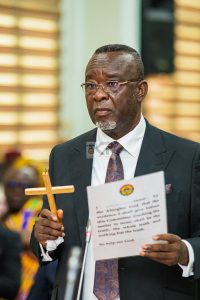
“We gather to vet a disputed nominee for the office of Chief Justice of Ghana. This should be a moment of national pride and institutional renewal.
“Instead, it has become a test of whether Ghana’s judiciary will remain independent or fall under executive and political domination.”
Majority Leader Objects
Barely had Afenyo-Markin concluded his opening remarks when Majority Leader Mahama Ayariga rose with a sharp objection. Referring to the Standing Orders of Parliament, he cited Order 122 and Order 123, which regulate debate and the content of speeches.
He argued that the term “disputed nominee” was out of order and violated the rule that Parliament cannot discuss the conduct of certain high officials, including the Chief Justice and justices of the Superior Courts, except by a substantive motion.
“Our rules indicate exactly what we can do or not do when we gather here,” Mahama Ayariga stated.
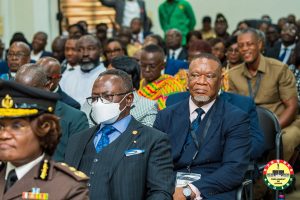
“Order 123(7) says the conduct of the Speaker, the Chief Justice, members and justices of the Superior Court of Judicature shall not be raised in Parliament, except upon a substantive motion. There is no dispute before us regarding this nomination.
“Therefore, the honourable member has no right, no lawful authority, to refer to the nominee as a disputed nominee.”
The Minority side were visibly dissatisfied. Chairman of the Appointments Committee, Bernard Ahiafor, then stepped in, ruling that Afenyo-Markin, as the one who had used the controversial term, should be allowed to respond.
Afenyo-Markin Fires Back
The Minority Leader, visibly agitated but composed, insisted that the Majority Leader was “acting in bad faith” and trying to obstruct the vetting process.
“Chairman, with the greatest respect, the rule the Majority Leader pertains to debates on the floor of the House, not here in committee,” he argued.
“I am not debating; I am making an opening remark. If the Majority Leader has anything to say, he can respond in his own submission, not by interrupting me line by line.”
He accused the Majority side of trying to use their numerical strength to silence legitimate opinion.
“There are dark clouds indeed in this country when, by mere operation of a super-majority, a Member of Parliament cannot even make a comment,” he fumed.
The Chairman listened keenly, occasionally interjecting to remind both sides to remain within “the principle of brevity and order.”
Rules Versus Rights
But the Majority Leader was not done. Reading directly from the rule book, he cited Order 123(3), stressing that the words of any member deemed “offensive, insulting or unbecoming” could be ordered withdrawn.
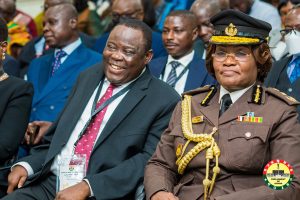
Mahama Ayariga argued that describing the nominee as “disputed” implied wrongdoing or illegitimacy, an insinuation that impugned his integrity.
“You cannot look the nominee in the face and refer to him as a disputed nominee and expect me to sit here and not respond.
“You are not in court disputing his nomination. There is no dispute before us. So he must withdraw and apologise to the nominee,” he thundered.
Afenyo-Markin Presses On
Despite the Chair’s guidance, Afenyo-Markin pressed on. “Let me be unequivocally clear. The Minority in Parliament objects to and unequivocally condemns the coordinated campaign to subjugate Ghana’s judiciary to political domination,” he declared.
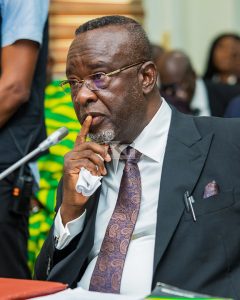
The Chairman, in response, cautioned that members must be guided by Order 103(d), which prohibits the reconsideration of matters already decided by Parliament in the same session.
“The Standing Orders are clear that a motion shall not be moved to reconsider any specific question upon which the House has come to a conclusion during the same session.
“By necessary implication, we cannot reopen matters already decided by the House. The Speaker has ruled on this matter, and that ruling binds us all,” the Chairman reminded.
Despite the caution, Afenyo-Markin continued, maintaining that the Minority would not be intimidated.
“Let me be clear, Chairman, the Minority in Parliament condemns and objects to any attempt to subjugate the judiciary to political control. We have a duty to speak when due process is violated,” he said.

He added that his side of the House remained concerned about the manner in which the former Chief Justice, Justice Gertrude Araba Esaba Torkornoo was removed.
“On April 22, 2025, the then Chief Justice was suspended following a prima facie determination by the Council of State.
“Subsequently, a committee chaired by Justice Gabriel Scott Pwamang was established to investigate her. The work of that committee, with the greatest respect, amounted to a travesty of justice,” he stated.
Mahama Ayariga Intervenes

Mahama Ayariga shot back saying, “Chairman, the rules are clear. The conduct of a judge or the Chief Justice cannot be raised here except by substantive motion.
“He has just described the conduct of a Supreme Court Justice as a travesty of justice. I will not allow even an inch of the rules to be breached.”
Chairman Rules
The Chairman again reminded both sides to proceed with caution, urging them to respect the principle that those who are not present to defend themselves in this case, members of the judicial committee should not be criticised publicly in parliamentary proceedings.
He ruled that the statement describing the committee’s work as a “travesty of justice” should be expunged from the record.
Afenyo-Markin protests
“Chairman, this is unacceptable. The Majority Leader keeps obstructing our remarks. I know he is your leader, but this is unfair,” he said firmly.
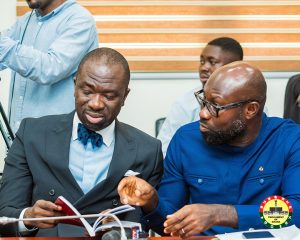
Nevertheless, he continued with his submission, insisting that the removal of Her Ladyship Justice Gertrude Araba Esaba Torkonu as Chief Justice “was cloaked in opaque circumstances, unacceptable to the jurisprudence of our country.”
The Chairman again cautioned him to stay within the rules, noting that personal opinions about prior judicial processes had no place in a vetting session.
Mahama Ayariga Objects
The Majority Leader, Mahama Ayariga, immediately rose again to object.
“Chairman, the rules are clear. The conduct of a judge or the Chief Justice cannot be raised here except by substantive motion. The honourable member has just described the conduct of a committee chaired by a Justice of the Supreme Court as a travesty of justice. That is a clear violation,” he said.
Tempers Flare
Seeing tempers flaring beyond control, Chairman Ahiafor again stepped in. “Honourable members. We are here to vet a nominee, not to sit as a court over another committee. Let us be guided by fairness. Those who are being referred to are not here to respond. Describing their work as opaque or as a travesty is unfair and will be expunged from the record,” he pleaded.

Despite the ruling, the Minority Leader maintained his stance, insisting he was expressing a constitutional opinion, not attacking personalities.
“With the greatest respect,” he replied, “I am critiquing the committee’s work, not the personal conduct of the judge. I am saying that in our view, the process amounted to a travesty of justice. That is a legitimate opinion.”
Transparency
The Minority side continued to question the constitutionality of the removal of the previous Chief Justice, insisting the process lacked transparency.
“It is our contention that the process leading to her removal was unfair, lacking due process, and did not adhere to constitutional procedure,” Afenyo-Markin said.

The Majority Leader rose yet again, this time warning that persistently violating the rules of Parliament itself could constitute a breach of privilege.
The Chairman echoed similar sentiments, reminding both sides that the committee was not sitting to review any other committee’s decision or the ruling of a court.
“We must be fair,” he said. “You cannot describe the work of another committee when its members are not here to respond. That will offend natural justice.”
But Afenyo-Markin was not finished. He argued that seven separate cases were currently pending across different jurisdictions, all questioning the constitutional validity of the former Chief Justice’s removal.
“Seven separate proceedings across three jurisdictions the Supreme Court, the High Court, and the Equal Rights Court — have been filed,” he said.
Order 103(f)
Before he could continue, the Majority Leader objected again, citing Order 103(f), which forbids members from discussing matters pending before the courts in a way that could prejudice judicial outcomes.
“Our rules are clear on pending matters. A motion shall not relate to any issue which is the subject of a judicial action in such a way as to prejudice the interests of the parties. What you cannot do in the chamber, you cannot do in committee,” Ayariga argued. He accused Afenyo-Markin of veering into sub judice territory.
“You are a senior lawyer. You know these rules. We do not comment on matters pending before the courts. We even avoid referring to them. So please, stay within bounds,” he said sternly.
Parliamentary Practice
The Majority Leader questioned Afenyo-Markin’s understanding of parliamentary practice.
“Show me the rule that gives you the right to make a preliminary statement. It is not in our Standing Orders. We only developed it as a practice, a courtesy for welcoming remarks. You cannot turn that into a press conference where you attack and impugn people.”
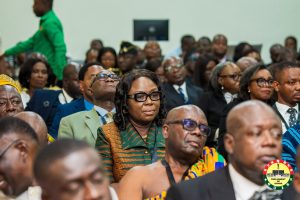
But Afenyo-Markin remained firm, appealing to established practice and parliamentary tradition.
“With respect, it is not just about the written rules. It is also about practice and precedent. This is not the first time leaders have made preliminary comments before vetting begins. We must balance practice with procedure.”
Restore Order
As the exchanges wore on, Chairman Ahiafor made one final attempt to restore order.
“We are not here to review or retry any case. This committee must focus on the nominee before us. Let us avoid language that offends our rules and proceed with decorum,” he stressed.
He warned that the records of Parliament must remain “untainted by offensive or prejudicial remarks,” and reiterated that anything contrary would be struck out.

